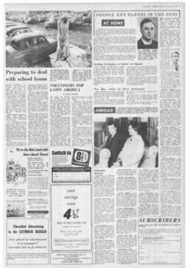Page 5, 24th December 1965
Page 5

Report an error
Noticed an error on this page?If you've noticed an error in this article please click here to report it.
Tags
Share
Related articles
Television Dangers
Tv/radio By Ian James
There'll Be No Corruption; Says Eammon Andrews
Looking And Listening
Ian James On T.v.radio
PAULA DAVIES WRITES:
Parents can do so much
AMYSTIQUE has grown up around television. It was first the snob thing to hose; then the snob thing not to have. People who watch the "goggle-box" have been called "square-eyed". As the telephone has been described as the killer of letter-writing, so tv has been blamed for a so-called dearth in conversation and reading.
".. . it is the curse of Western civilisation," according to the Provost of University College, London, who blames pictures and especially television for stopping people from using their brains intelligently.
Yet books are selling as never before; musical instruments, particularly pianos are enjoying a resurgence in popularity; films— perhaps due to tv competition— are better than ever.
What, in fact, is the position of television in our lives? Are we all turning ourselves and our children into materialistic morons as the result of watching the "infernal machine"? According to the Secretary of the Television Society the average man who lives to 75 will have spent 121 years watching television.
The time, although frightening, does not matter half so much as
the content of those years. I 110111d be the first to admit that a lot of programmes are nothing but banal rubbish, but it is up to us to choose. The time could be well spent. watching history in the making, educational programmes and good entertainment.
11 could be wasted through watching the constant repetitions and rehashes of which those terrible old weekend films are a good example. It could stimulate thought or stultify it. But—and this is the main point I want to make—it depends just as much on ourselves as on the programme planners whether we get anything worthwhile out of watching television.
This emphasis I put on our own attitude can be best seen through the way in which parents allow television to be used for their children.
With the knowledge of vociferous complaints and the organisations being formed to combat the corrupting influence of television, I tried to think about my own attitudes as a child. My parents bought it, I think, to slop us fighting—not a good reason, perhaps. but one with which many parents might sympathise. e enjoyed it tremendously. dell if it only stopped us fighting some of the time, and we were not, I think, corrupted by it. The reason for this must lie partly in the fact that we were at boarding school for a great part of the year and partly alsh in our parents' judicious use of it.
Reading about a woman who complained recently that her children were frightened after watching Dr. Who, I wondered if she had ever thought of switching off the set.
Are all mothers quite as permissive as this one? After talking to many of them from different walks of life it is comforting to know that they are remarkably sensible about it.
"If they've got to go to school they're in bed by 8 p.m. whatever's on the telly," said Maureen, who has two boys. "If it's a Friday or Saturday and there's a cowboy film on 1 let them slay up to watch it."
Another mother I spoke to who has six children, ranging in age from 6 to 14, is understandably more strict. "During term time I only allow the television on between S p.m. and 6 p.m. for the younger ones. On Friday
I weaken a bit, and Saturday I allow them to watch more or less what they want."
"How do you treat television?" I asked, "as an ogre or a friend?" "Neither," she replied. "One has to be firm about it in the same way as one is firm about children eating too many sweets.
"Is it harmful?" I asked. "I think it can do harm." she replied. "By this I don't mean through cowboy films or fantasy thrillers like The Avengers, for example. But when they put on a play which purports to be about normal living but which in fact places pleasure and all material values above everything else. children can be damaged by it.
"They are not sufficiently experienced to judge. In these cases we turn off the set and talk about it and point out to the children what we think is wrong with it."
This seems in be a sensible approach to the difficulties of bringing up children in a Christian way. What we should not forget, I think, is that what counts most of all is our own example and the way we live-not the way some beatniks from 1Batise.rma 1Batise.rma choose to run their ive
blog comments powered by Disqus











